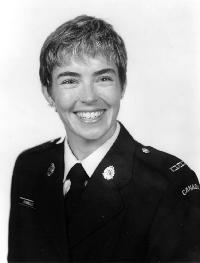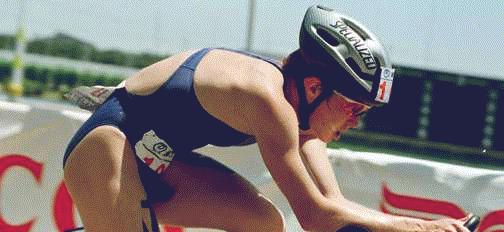
|
Lynne Bermel's Column |
August 25, 2000
The Life and Times of Sharon Donnelly - Part Two
This is the second of a three-part feature on Olympic triathlete Sharon Donnelly.
Back and Forth
In 1992 Sharon was posted to National Defence Headquarters in Ottawa. Finally, she had an 8 to 4 job where she could get some consistent training under her belt. She had seen flashes of promise but every time she started getting better, another assignment, another exercise, another posting got in the way of developing any potential.
Those 8 months in Ottawa saw her performances skyrocket. "It showed me what consistent training could do." It didn't last long however.

Sharon In The Army The next year, she was off to Petawawa, which meant another setback in her training. Soon after arriving at the base, her unit was deployed to Bosnia. As an officer in the rear party, hers quickly became an all-consuming job. In what little time she had, she coached the base running team. She still managed to qualify for the World Championships in Manchester England that year as an age grouper but she didn't have a particularly noteworthy performance. Looking back, she says she was lucky to get in 6-8 hours of training a week. Not enough to make a champion.
Sharon coaches biathlon
The following year, she was assigned to coach the unit's biathlon team. "But I don't know how to ski," she argued. "Matters not," came the word from Headquarters. "You've got a high VO2max, heart and lungs. What more do you need?" That first summer, her group of soldiers, ranging from 24 to 40 (none of who had ever been on skis) would watch as other units strode by on roller skis. Her guys would ask her: "When are we going to start doing that?" "Wait for the snow," she'd tell them. "It's a softer landing."
She learned to ski that year (not well she'll tell you) but good enough to qualify for the Canadian Military Team's biathlon camp and a win at the Ontario provincial championships. "I snowplowed down all the hills," she says "I only came out ahead because I was all lungs up the hill." "It wasn't pretty but I got through it."
Dave lays it out
By 1995, Dave and Sharon started feeling a strain in their relationship. Although Dave was posted to Ottawa, their busy schedules were getting in the way. "We hardly saw each other," says Sharon. She was busy at work, going on 1-2 month long winter exercises…. We nearly broke up that year."
It was decision time. They could feel their careers and the distance were driving them apart. They had to decide on priorities. Dave laid out the cards. He had seen Sharon's talent long before she did. There were noises afoot that the triathlon was going to be a full-medal sport in the 2000 Olympics. Sharon had won a number of triathlons on very little training and his instinct told him she had only scratched the surface of her potential. "Dave said to me one day: 'Look, Sharon, you have two options. Stay in Pet and see how that effects us or get out of the military. You've got the talent to be one of the best in the world. At least give it a try. Even if you fall flat on your face, at least you've tried."
That year, Sharon and Dave drove out together to the Canadian Championships in Fort McMurray, Alta. It was the first time drafting was allowed on the bike; a precursor to the Olympic format. Sharon had a stellar race, placing 7th among the elites. She was named as a standby to the team for the World Championships.
For the ensuing weeks, she waited by the phone to hear if she'd made it or not. She was about to make her flight booking when she got a call from Triathlon Canada: "Sorry, Sharon, you didn't make it. Bad luck." She told them: "That's OK. I'm glad you called to let me know. Next year, there won't be any question."
Sharon goes big-time
Sharon left the military that year and moved into Dave's home in Orleans. "That was a really hard year for me," she says. "I left the house I owned. I didn't have a job and the self-esteem that goes with it." She joined a local reserve unit and started working part-time at The Running Room. "It wasn't for the money," she says, 'I just wanted to keep myself busy."

Sharon In Ishigaki Japan World Cup Race The following spring, she raced her first-ever World Cup. She had called Triathlon Canada before heading over to Ishigaki, Japan if they could provide some sort of financial sport. (She also asked if she was allowed to enter the race). They told her to "just show up." If you do well, they said, we'll talk.
"I knew I had to prove myself. We shelled out $5000 to get to Japan for the two World Cup races. Dave was essentially my sponsor. " Sharon placed 7th - a top 10 finish - and caught the eye of ITU President Les MacDonald. "He came up to me after the race and asked if I was going to Paris and Bermuda. I told him, I couldn't afford it but I would do the World Cup in Drummondville, Quebec." MacDonald told Sharon he would give her $500 US towards Paris and Bermuda, free entry and accommodation once she got there. "I wanted to show I was committed, so I went to all three races on successive weekends." She ended up 8th in Paris, 12th in Drummondville and had equipment problems in Bermuda. "It was brutal. Three weekends of racing in a row just about did me in. I've never done it since."
The Demons
She found the 1997 season one of her toughest ever. "So much happened. In hindsight, it was good for me but it was an exhausting period." She went to 11 World Cups in 10 different countries that year with several top 10 finishes. She won the Canadian Championships in Cornerbrook, Nfld. and was ranked 9th overall in the World.
1998 ushered in its own set of surprises. "It was an interesting period." she says. In almost every race, she experienced one technical problem after another: flat tire, bottom bracket, chain derailment, and ill-fitting shoes. "In many cases, they were the result of rookie moves. Yes, some were accidents but others could have been avoided. It taught me to pay more attention to details."
Sharon also started facing some inner demons. "At one of my most important races - the Canadians - I tried a different race tactic and it didn't work." She fleetingly considered leaving triathlons. It was going to be another two tough years until the Olympics.
1998 was also the year when top performers were multiplying at an unstoppable rate. With the Olympics on the horizon, the Europeans started making their presence known. "Overnight, it went from 30 top women in a World Cup to 70. Every weekend, there would be another new Erika Molner. The level of competition just took off."
Sharon was getting more and more frustrated. She realized she had to start concentrating on the little things. She had to pay more attention to her equipment, transition training and technical aspects. She had to become more vigilant in training. She had to start experimenting.

Part Three Next Week...
Visit Sharon's web site at: SharonDonnelly.com
Contact Lynne via email @ lbermel@runnersweb.com
For more on Lynne's background read this interview with Wayne Scanlan which appeared originally in the Ottawa Citizen.
Top of Article